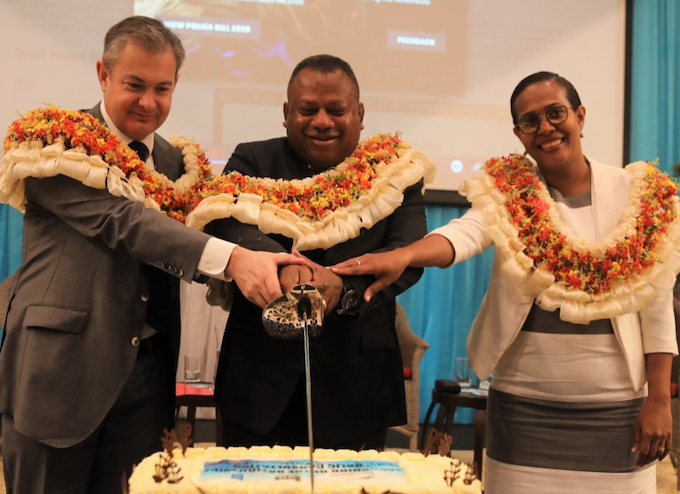
By Michael Field of The Pacific Newsroom
New Zealand’s High Commissioner in Fiji, Jonathan Curr, has taken to social media to counter claims that Wellington drafted a bill to give greatly increased powers to Fiji’s often corrupt police force.
The Police Bill, tabled in Parliament last week, has been labelled draconian by critics while social media has been merciless over the friendship between prime ministers Voreqe Bainimarama and Jacinda Ardern.
She signed off on the deal in Suva in February 2020.
New Zealand is spending $11 million over four years to improve the Fiji Police Force which, since the 2006 Bainimarama coup, has been under military control.
Amid intense criticism on Facebook, Curr took to Twitter: “NZ is engaged in a 4 year strengthening programme with @fijipoliceforce, partnering with @UNDP_Pacific & @nzpolice to improve policing, and support Fiji to meet international human rights obligations.”
NZ is engaged in a 4 year strengthening programme with @fijipoliceforce, partnering with @Undp_Pacific & @nzpolice to improve policing, and support #Fiji to meet international human rights obligations.
— Jonathan Curr (@JCurrNZ) March 5, 2021
In a second tweet, Curr said a component of the aid programme was to support public consultations on the Draft Police Bill 2020, led by Ministry of Defence and National Security
He added: “NZ has not been involved in drafting or developing the Bill.”
And in a third tweet said: “Such an important piece of legislation needs to be consulted with Fiji’s citizens. This is an opportunity for the community to influence the final shape of the Bill, and to express concerns & provide feedback.”
NZ push for consultation ‘useful’
Fiji lawyer and politician, Tupou Draunidalo, went on Facebook to support Curr, suggesting New Zealand’s insistence on consultations was useful.
“If NZ did not sponsor the consultations, we would get the bill in its raw form through s.51 standing orders (as is normal) with one hour debate.”
She added: “So what the NZ government is sponsoring (to allow every Fijian a say in the Bill, not even just the parliamentarians) is highly commendable for current and future governance infrastructure.”
New Zealand, Australia and the UN Development Programme were rebuilding what the opposition and their allies destroyed over decades, Draunidalo said.
“If we really prefer no consultations, just write to the (New Zealand High Commission) so that they don’t waste their money on the doomed.”
The consultation process was formally launched last week with some odd optics. Police Minister Inia Seruiratu joined with UNDP representative Nanise Saune-Qaloewai and Curr to grasp a large military sword to cut an over-iced yellow cake.
The significance was not explained.
Target audience
The consultation New Zealand is paying for involves online surveys and face-to-face interviews. The “target audience” for consultation was five to 10,000 people by the end of April.
Social media critics have been outspoken. One asked how long Curr had been in the country: “Do you not know that the public consultation process is a facade and the (FijiFirst Party) government will do whatever they want regardless of what the public’s views are?”
Another said it was “clearly unacceptable unless NZ foreign policy now supports draconian legislation overseas.”
One comment said it would have been better to train police because most of them “don’t even know what they are doing.”
Another writer said the consultation process was an excuse by the government which could then use parliamentary orders to claim ”it has received public scrutiny—therefore allowing this bill to pass through with limited debate on the floor of Parliament.”
Curr had earlier said New Zealand was working on enhancing investigative skills, providing early access to justice and promoting gender equality.
“This is critical to supporting the work of other components of the criminal justice system, and it is an important plank in the efforts of New Zealand and Fiji to combat shared threats such as trans-national organised crime,” he said.
Communications powers
Under the bill, Fiji police take new powers to monitor communications and forcefully enter premises to place tracking devices. Police will have the powers to secretly or forcefully enter any premises to place tracking devices, states the draft law.
Police can also secretly monitor and record “communications” of persons about to commit a crime or have committed a crime if the draft law is passed in its current form.
The law also allows police to recruit an “informer” who is described as “any person who, whether formally recruited by police or otherwise, provides information in relation to anything sought by police for any lawful purpose”.
Police officers will not be allowed to join a union, states the draft law and it will be unlawful for them to go on strike or to take any industrial action.
Ardern announced the aid package just before covid-19 ended overseas travel.
“In the same way we cooperate on issues that affect the whole Pacific like climate change, Fiji and New Zealand will work together to combat transnational crime and drug trafficking, which are having an increasingly negative impact across the region,” she said
“The more we can do to prevent countries like Fiji being used as a transit point for trafficking, the more we can stop drugs arriving on New Zealand’s borders.
“This police partnership programme highlights the deepening of relations between New Zealand and Fiji and is an important step in the strengthening of a key institution in Fiji.”
Michael Field is a co-convenor of The Pacific Newsroom. This article is republished with permission.











































